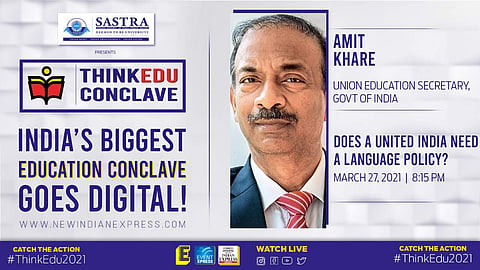

It is not imposing the idea of one-nation-one-language but accepting the plurality and diversity of India that the National Education Policy focuses on, said Education Secretary Amit Khare. Khare was speaking at The New Indian Express' ThinkEdu Conclave 2021. Sastra University's Vice-Chancellor Dr S Vaidyasubramaniam, TNIE Editorial Director Prabhu Chawla and senior journalist Kaveree Bamzai were part of the conversation.
The NEP focuses more on flexibility than on a one-size-fits-all approach, said Khare. "In fact, it is a diverse country and we are a multilingual society. What the National Education Policy emphasises is teaching in mother tongue and the regional languages — it isn't one-size-fits-all," said the secretary. "It is rather one nation multiple languages. But why not use our languages. One programme which has been started this year is the Ek Bharat Shreshtha Bharat programme. The policy itself gives the name — why not people from the north learn languages of the southern parts of India or eastern India learning about west India," he added while answering Chawla's question about whether the policy will strive to unite India by teaching them languages from across India.
The beauty of this policy is the flexibility it offers not only in terms of languages but courses as well, said Khare, "You have three-year degree programmes and four-year degree programmes as well. Similarly, the multiple entries and exit option is also an example of flexibility," he added. There are various components of this policy that will come into effect at different points in time, said Khare and added that the next year will see at least 10 of them. "The first is the academic bank of credit or the ABC. It is actually the ABC of the entire higher education system. If we want to have a multiple entry and exit system and a multidisciplinary system the Academic Bank of Credit is a must. Otherwise, it would be difficult to manage the records of the students. The work on the ABC is on and it will be there before the next academic session starts," he said. "The second is multiple entry and exit. That option we have discussed with the UGC — those institutions who join the ABC and have accreditation of at least A grade will be allowed to have multiple entry and exit system within the institution. Applying it across institutions will take a little more time because different institutions have different types of courses," added Khare.
Talking about teaching in regional languages, Khare said that it is not a case of language imposition but helping those who come from a non-English background. "The idea is to facilitate talented students who are from a non-English background (study in their mother tongue) so that the talent is not wasted. The online courses of the first year would be available in regional languages," he added. "The fourth aspect is the joint degrees with different foreign universities. The regulations are already under process by the UGC," he said and added that as a member of the commission, he has been part of discussions that have decided it will be a two-way process — we will send students abroad and also invite foreign universities to come to India.
The NRF will also be in place by the next academic session, the National Educational Technology Forum will be set up, the percentage of SWAYAM courses in any conventional programme has been increased from 20 per cent to 40 per cent, said the bureaucrat. "The idea of having a Common Entrance Exam for the central universities has been supported by them, including the University of Delhi. It will be an exam with weightage to the school board exams. If any deemed university or any other organisation are welcome to use this score," said Khare. "At least one university in a state should be in a position to offer distance education. The Institutions of Eminence will be allowed to have their own courses. A multidisciplinarity that we have talked about will start with the IoEs," he said and added that the plan is to have 50 IoEs — 25 public and 25 private institutions.
Replying to Dr Vaidhyasubramaniam's question about whether there will be a change in the eligibility criteria of IoEs, the secretary said, "Some changes are being considered for the eligibility criteria because under the existing criteria not many institutions would qualify. The policy is outcome-based and not input-based. The earlier criteria of net worth, building and infrastructure are all input-based. The output-based system would be what is their accreditation, ranking etc. Ultimately, excellence is measured in terms of ranking or accreditation," said Khare.
